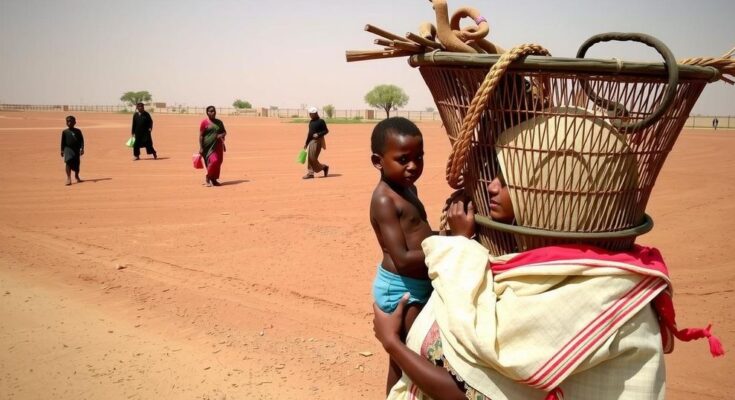Sudan is experiencing a severe famine crisis as the civil war continues, affecting 24.6 million people in urgent need of food aid. With conditions worsening, famine has spread to five regions. Efforts to mediate peace between the army and RSF have thus far failed, aggravating the humanitarian disaster. The government’s dismissal of the IPC’s reports raises concern over transparency and acknowledgment of the crisis’s severity.
Experts have raised alarm over a severe famine crisis escalating within Sudan, exacerbated by the ongoing civil conflict that has persisted for the past 20 months. A recent report indicates that famine conditions have spread to five regions, with approximately 24.6 million individuals—nearly half of the nation’s population—now in urgent need of food assistance. This crisis is directly linked to the protracted civil war between the Sudanese army and the paramilitary Rapid Support Forces (RSF), which has crippled the country’s food system and humanitarian conditions.
The Integrated Food Phase Classification (IPC), supported by the United Nations and various humanitarian efforts, has been pivotal in identifying and classifying famine situations. The Famine Review Committee (FRC) has issued warnings that, without immediate intervention, the situation may deteriorate further, potentially affecting even more regions in the upcoming months. Recently, Sudan’s military-backed government controversially announced the suspension of cooperation with the IPC, voicing concerns regarding the credibility of its reports and claiming they undermine national sovereignty.
Historically, the civil strife in Sudan—marked by internal power struggles stemming from a 2021 coup—has driven masses into despair, particularly in regions like Darfur and South Kordofan, where violence has directly impacted agricultural activities. As farmers abandon their fields due to conflict and displacement, the systemic issues contribute to a worsening humanitarian outlook. The toll of violence has been particularly grievous, with reports suggesting that significant civilian casualties and suffering have emerged as a hallmark of the conflict.
The ongoing civil war in Sudan has taken a devastating toll on the nation, igniting a humanitarian catastrophe that has far-reaching implications. Since the joint coup involving the army and RSF in 2021, competition between their leaders has devolved into open conflict, disrupting the social fabric and economic stability of the country. Sudan has struggled with recurrent humanitarian crises, and the current situation—marked by widespread famine—underscores the dire need for resolution and international assistance. The IPC’s initiative aims to classify and address these famine conditions comprehensively, emphasizing the gravity of food security in the affected areas.
In conclusion, Sudan is facing an unprecedented famine crisis, worsened by a civil war that has decimated agricultural production and exacerbated humanitarian needs. With nearly half of the population requiring immediate food aid, the international community is called to respond to avert a greater catastrophe. The ongoing conflict not only threatens lives but also dismantles essential social and health services, calling for urgent action to restore stability and support the millions affected.
Original Source: www.bbc.com




